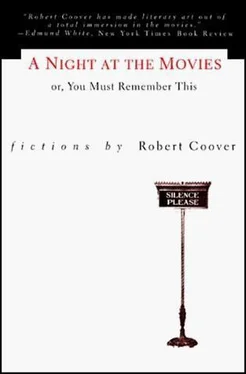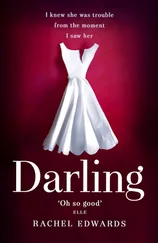And that was when these guys showed up.
Don't ask me who they were. I'm not even sure what they were. They came rising up out of the ground like from you-know-where. And you could tell these greasers meant business. Fluffy little clouds, my fanny, I thought, that boy shoulda stayed home on the farm! He looked like he was about to poop marbles, hunkered down there with his willow between his legs and his hat squashing his big ears out. Even his twitchy feet had gone dead on him. I figured the rube was done for and was just starting to feel sorry for him, when whaddaya know! he suddenly rears up, turns that little white-tipped stick of his into some kind of magical popgun, and starts mowing down the lot of them! Rappy-tappy-tap, down they go, blood and brains blowing everywhere, it's a fantastic rub-out! Hey, I thought, this guy is good!
They return as they left: as though compelled. Arising like plants from the soil. Have they been called back because of the girl? To present her perhaps with a moral alternative? Or to recall him to the world of men? They bring with them, certainly, the aura of purpose, of culture, law, of subjection of the will to the greater beauty of the whole, but this aura rests upon them more like an affliction than a promise. Or perhaps it's just those preposterous squared-off hats.
They pause, standing in a row like soldiers at ease, their walking sticks planted between their legs, their white-gloved hands clasped at the heads as though protecting their genitals. Or pointing to them. They seem ready to serve, yet uncertain as to the nature of their service. Is he to join their ranks? Is she to embellish them? Or are they mere witnesses to a drama from which they are — ontologically, as it were — excluded? He provides an answer of sorts: he raises his walking stick and, pointing it like a fairground rifle, shoots one of their number: p- tang ! The man crumples and falls, clutching at the sky.
Nothing changes. And everything changes. The outsider, it seems, is here to kill. And they, his hosts, are here to die. Possessed suddenly of an amazing and exemplary grace, he executes them one by one, but after the first surprise, there is no other: p- tang ! p- tang! — down they go, grabbing at their breasts, their faces, reaching desperately for the darkening sky.
The girl meanwhile is falling madly in love — or perhaps is at last being rejoined with her true love — her face lit up now with a kind of mystical ecstasy. She falls into step with him, moving in adoring concert, yet never touching, discovering — or rediscovering — an essential affinity, a zest for life and art — p- tang ! p- tang! — innately shared. He fires from over his head, drops them two at a time from the hip, even lifts his leg and shoots from under it, as though to deepen the humiliation of their ineluctable and spellbound deaths. She moves among the victims, her heels rapping out a pitter-patter of termination, flouncing her skirts like the dropping of final curtains.
He knocks another one down, shooting blindly over his shoulder, then, holding the stick at his belly — ruckety-tackety-tuckety-tack! — impatiently machine-guns the lot. The dying men whirl and writhe, blood jetting from their bodies like the release of some inner effervescence. Their executioner, grown tall, staggers momentarily as though drunk with pleasure, turns wide-eyed toward the girl. She draws near to complete their final figure, which would seem, by the expression on her face, to be nothing short of orgasm (perhaps it is already overtaking her, as his arms reach out she is rolling to her back, her eyes closed, mouth agape) -
But wait! there's one still standing! This one seems smaller somehow, or else more remote, planted at the foot of the iron tower like a flaw in the visitor's own character, hands clasped soberly at the head of his stick. The visitor drops the girl (she gasps, grabbing herself as she falls), draws himself erect, and, his boyish grin frozen on his face, fires: the man leans to one side, ducking the shot, and says: "I know what you're trying to do, my friend, and I don't want to take the wind out of your sails, but perhaps, in your pursuit of untrammeled happiness, you have been a little imprudent. For there are dates that cannot be broken, and words, you know, that cannot be spoken. This is more than a clash of taste, a bit of a tiff. You are seeking, through murder — "
His executioner, sweating now though still grinning widely, teeth clamped in what is either manly determination or unbridled terror (the girl, groaning, convulses ambivalently at his feet), fires again: the man calmly leans the other way and continues, "You are seeking, as I say, through murder, to overcome that ambivalence at the heart of your quest, but what you are killing is merely something in yourself. Indeed, it is unlikely that, when the killing is done, there can possibly be anything left. You cannot celebrate, my friend, what does not exist. There is no Adam, for all your wishful thinking, and there never was; those treacherous brothers just made that up to account for their discontent. Yours is a grave misapprehension, with consequences far beyond your hasty actions here. Believe me, a few technical skills, gutsiness, and a silly smile will not resolve — "
Enraged, the newcomer bounces his swagger stick off the street and, as though to argue the case for personal ingenuity and pluck (it's not just technology, blast it, it's a whole new spirit — -!), grabs it on the rebound and raises it like an Indian's bow. "Wait!" cries the man at the foot of the tower. The overhanging globes are so aligned as to seem to be pointing to his chest. "Hear me out!" The girl can be seen crawling away into the shadows in her glossy negligee, perhaps to sleep awhile, and dream. "I admit your instincts are sound, but your methods are ingenuous! It's not whose hats, but who's — !" His opponent draws the bow — or seems to: there is a mystery about the arrow — and lets it go. There is a crack like a rifle shot, the man at the tower cries out: " No, no, damn it! SHOOT THE OLD ME-E-E-e-ennn — !" and, flinging an arm in the air, crumples, his face falling into shadows.
The intruder is alone now on the street, except for all the bodies, those bitten apples, heaped about like cairns, like gates for a dance routine. The night has deepened. He tucks the stick under his arm, straightens his white tie, brushes off his tails, as though recollecting an old code. He looks at his feet: they are quiet at last. He grins at this, and shrugs, waggles his hips. In the heavy silence (he will never, never change), he doffs his hat and takes his spidery bow.
It is dark in Rick's apartment. Black leader dark, heavy and abstract, silent but for a faint hoarse crackle like a voiceless plaint, and brief as sleep. Then Rick opens the door and the light from the hall scissors in like a bellboy to open up space, deposit surfaces (there is a figure in the room), harbinger event (it is Ilsa). Rick follows, too preoccupied to notice: his café is closed, people have been shot, he has troubles. But then, with a stroke, he lights a small lamp (such a glow! the shadows retreat, everything retreats: where are the walls?) and there she is, facing him, holding open the drapery at the far window like the front of a nightgown, the light flickering upon her white but determined face like static. Rick pauses for a moment in astonishment. Ilsa lets the drapery and its implications drop, takes a step forward into the strangely fretted light, her eyes searching his.
"How did you get in?" he asks, though this is probably not the question on his mind.
"The stairs from the street."
Читать дальше












